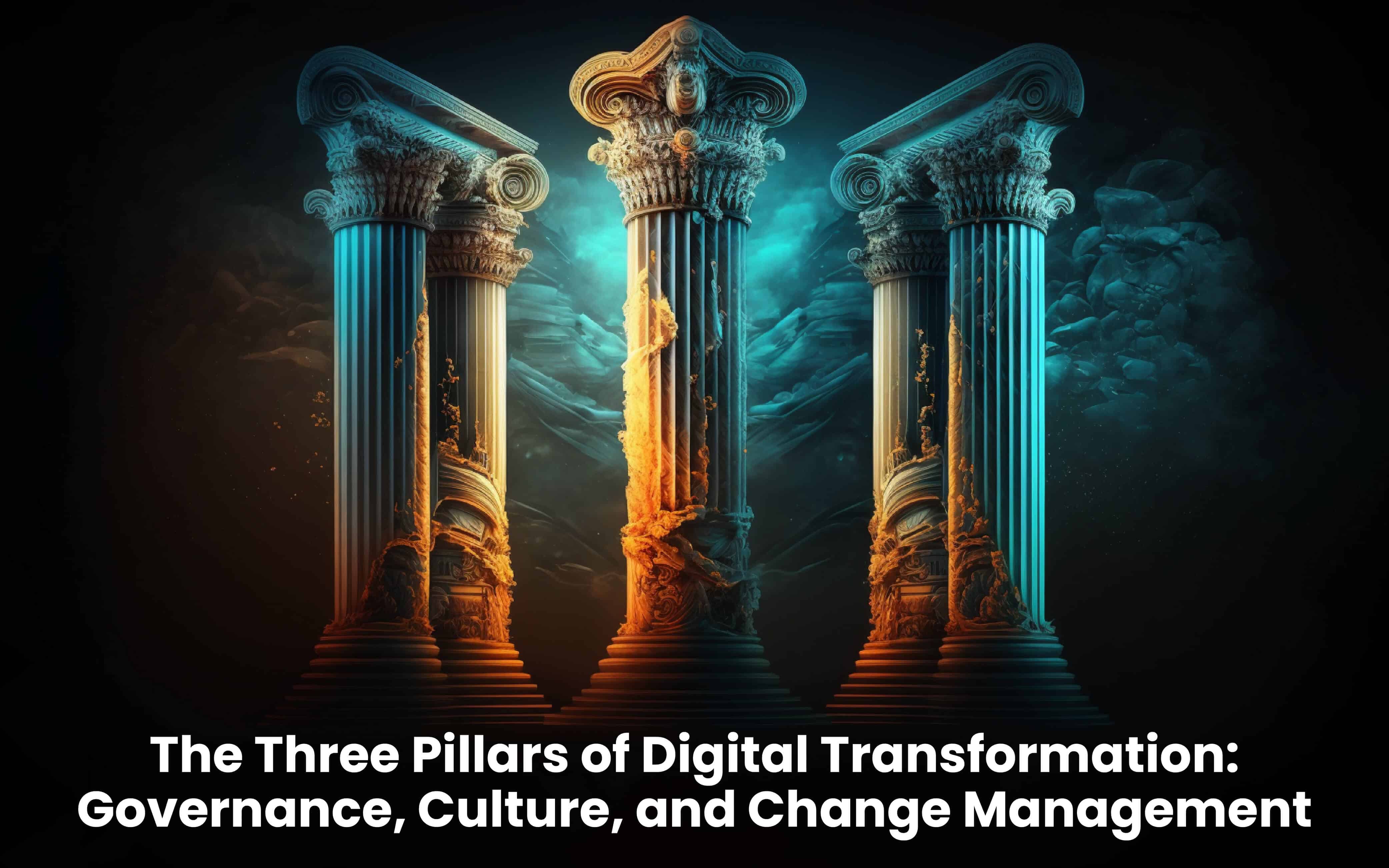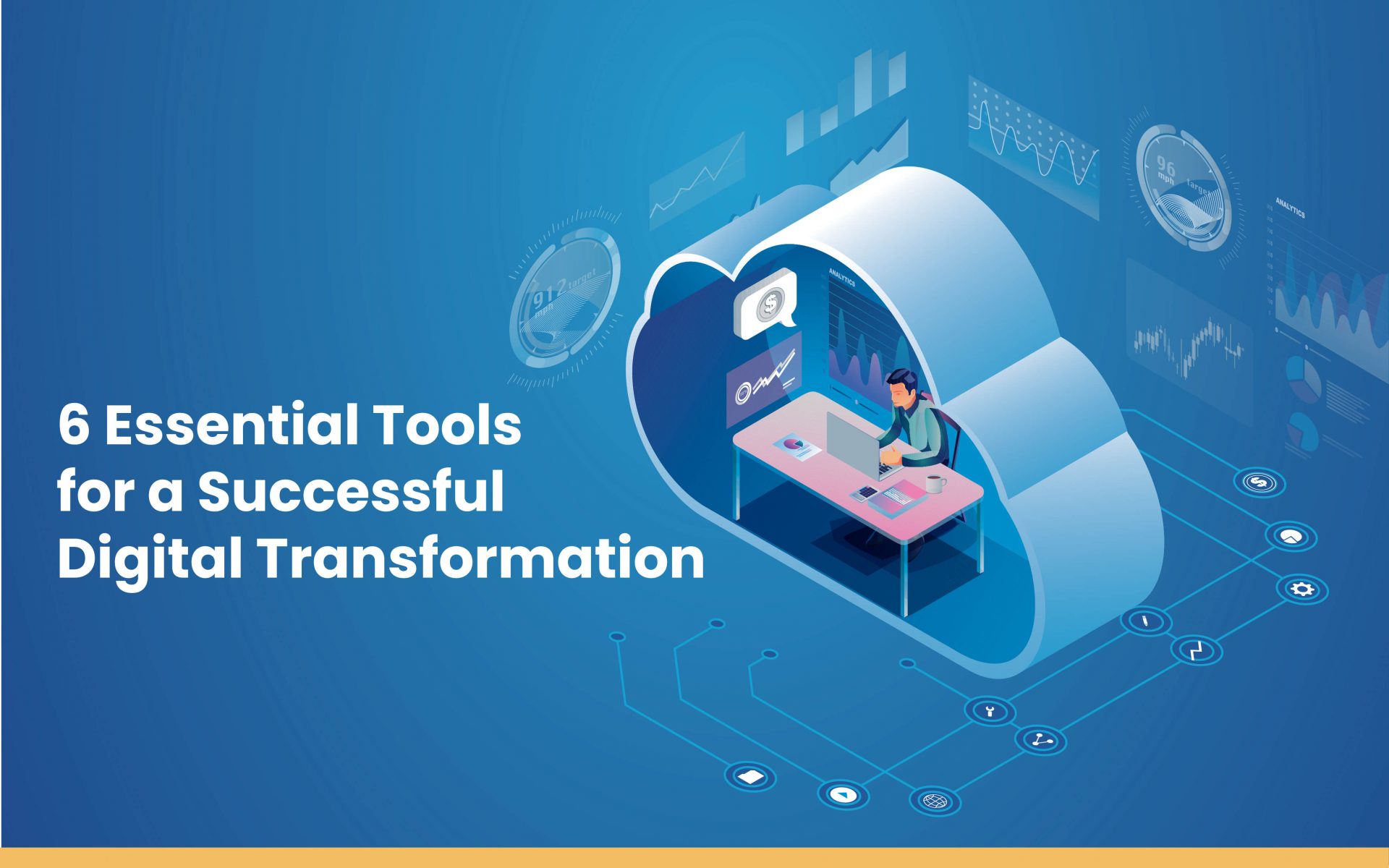Blogs
To know about all things Digitisation and Innovation read our blogs here.
Digital Transformation
Three Pillars of Digital Transformation: Governance, Culture, and Change Management
SID Global Solutions
27 February 2023

Introduction
Digital transformation is no longer a buzzword but a reality for businesses of all sizes and industries. It has become critical for enterprises to transform digitally to stay relevant, competitive, and future-ready. However, digital transformation is not just about implementing new technologies but also about adopting a digital operating model that prioritizes governance, culture, and change management. In this guide, we will explore the three pillars of digital transformation in-depth and provide an analysis of the latest trends.
Governance
Governance is a critical component of digital transformation, as it provides a framework for managing digital initiatives effectively. It encompasses policies, procedures, and controls that guide the use of digital technologies in the organization. Good governance ensures that digital initiatives are aligned with business objectives, managed efficiently, and comply with regulations. Here are some key considerations for governance in digital transformation:
- Align digital initiatives with business objectives: Digital initiatives should be aligned with the organization’s overall strategy and objectives. This requires a clear understanding of how digital technologies can enable the organization to achieve its goals. Digital initiatives should be prioritized based on their strategic importance, and their impact on the organization’s operations, customers, and stakeholders.
- Establish clear roles and responsibilities: Digital initiatives involve multiple stakeholders, including business leaders, IT professionals, and external partners. It’s important to define clear roles and responsibilities for each stakeholder, to ensure that everyone understands their role in the digital transformation process. This includes defining the responsibilities of the executive sponsor, project manager, technical lead, and other key stakeholders.
- Ensure data privacy and security: Digital initiatives often involve the use of sensitive data, such as customer information and financial data. It’s important to establish policies and procedures that protect the privacy and security of this data. This includes defining data access controls, ensuring data encryption, and implementing security protocols to prevent unauthorized access.
- Manage risk: Digital initiatives involve risk, including technical risk, operational risk, and regulatory risk. It’s important to establish a risk management framework that identifies, assesses, and mitigates risks associated with digital initiatives. This includes monitoring risks throughout the project lifecycle, and implementing appropriate controls to manage risks effectively.
- Ensure compliance: Digital initiatives must comply with a range of regulations, including data protection laws, industry standards, and government regulations. It’s important to establish policies and procedures that ensure compliance with these regulations. This includes defining data retention policies, implementing appropriate security controls, and conducting regular audits to ensure compliance.
Also Read: How Digital Transformation is Shaping the Future of Customer Experience?
Culture
Culture is a critical component of digital transformation, as it determines how employees engage with digital technologies and how they collaborate to achieve digital objectives. A strong digital culture encourages innovation, experimentation, and collaboration, and provides a foundation for successful digital initiatives. Here are some key considerations for culture in digital transformation:
- Define a clear vision for digital transformation: To build a strong digital culture, organizations need to define a clear vision for digital transformation that is aligned with their overall strategy and objectives. This requires a shared understanding of what digital transformation means, why it’s important, and how it will benefit the organization.
- Foster a culture of innovation: A strong digital culture encourages innovation and experimentation, and provides a safe environment for employees to take risks and try new things. This requires a mindset that values experimentation, learning, and continuous improvement. Organizations can foster a culture of innovation by encouraging collaboration, providing training and development opportunities, and recognizing and rewarding success.
- Empower employees: Digital transformation requires a culture of empowerment, where employees have the autonomy and support they need to make decisions and take action. This requires a culture that values trust, transparency, and accountability, and provides employees with the resources and tools they need to succeed.
- Communicate effectively: Communication is critical to building a strong digital culture, as it helps employees understand the vision for digital transformation, their role in the process, and the benefits of digital technologies. Effective communication requires a range of channels, including face-to-face meetings, email, social media, and other digital tools. It also requires a culture of transparency, where information is shared openly and feedback is encouraged.
- Develop digital skills: To succeed in a digital world, employees need the skills and knowledge to use digital technologies effectively. This requires a culture of continuous learning, where employees are provided with the training and development they need to stay up-to-date with the latest digital trends and technologies. Organizations can provide digital skills training through a range of channels, including online courses, workshops, and mentoring.
Also Read: Why a Digital Mindset is Critical for Customer-Centric Digital Transformation
Change Management
Change management is the process of preparing, supporting, and helping individuals, teams, and organizations to make a successful transition from the current state to a desired future state. In the context of digital transformation, change management is critical to ensure that the organization is able to adapt to the new technologies, processes, and ways of working that come with digital transformation. Here are some key considerations for change management in digital transformation:
- Develop a change management strategy: To effectively manage change in digital transformation, organizations need to develop a change management strategy that identifies the stakeholders, defines the scope of the change, outlines the approach for managing the change, and sets the metrics for success. The change management strategy should be aligned with the overall digital transformation strategy and objectives.
- Engage stakeholders: Change management requires the engagement of all stakeholders, including executives, employees, customers, and partners. This requires a communication plan that outlines the key messages, channels, and timing for engaging stakeholders. Effective engagement requires a focus on the benefits of the change, the risks and challenges, and the actions required to support the change.
- Provide training and support: Digital transformation requires new skills, processes, and ways of working. To support the transition, organizations need to provide training and support to employees, including training on new technologies, processes, and workflows. Support can include mentoring, coaching, and access to digital tools and resources.
- Monitor and measure progress: Change management requires ongoing monitoring and measurement to ensure that the change is progressing as planned and to identify areas for improvement. This requires the establishment of key performance indicators (KPIs) and the use of data analytics to track progress and identify trends.
- Continuously improve: Digital transformation is an ongoing process, and change management is a critical component of continuous improvement. This requires a culture of innovation and experimentation, where feedback is encouraged, and new ideas are explored. Organizations can continuously improve their change management processes by soliciting feedback from stakeholders, analyzing data, and making adjustments as needed.
Also Read: How Low-Code Software Tools are Fueling Digital Transformation?
Conclusion
Digital transformation is a complex and challenging process that requires organizations to adopt a digital operating model that prioritizes governance, culture, and change management. The three pillars of digital transformation provide a framework for organizations to create a solid foundation for digital initiatives, ensuring that they deliver the expected value and outcomes. The latest trends in digital governance, culture, and change management emphasize agility, growth mindset, and human-centricity, enabling organizations to navigate the complex digital landscape and stay ahead of the competition. By adopting a people-first approach, investing in digital talent and skills development, and creating a culture of innovation and experimentation, organizations can transform digitally and create new growth opportunities.
SID Global Solutions is a leading provider of digital transformation solutions that can help clients overcome the challenges associated with digital transformation. With a team of experienced professionals, SID Global Solutions offers a range of services that can help clients develop and implement a digital operating model that prioritizes governance, culture, and change management. By leveraging the latest technologies and best practices, SID Global Solutions can help clients optimize their digital investments, reduce risk, and achieve better outcomes. Whether clients are looking to improve their digital strategy, build a digital culture, or manage change effectively, SID Global Solutions has the expertise and tools needed to help them succeed. Through its people-first approach, SID Global Solutions can empower clients to transform digitally, create new growth opportunities, and stay ahead of the competition.









